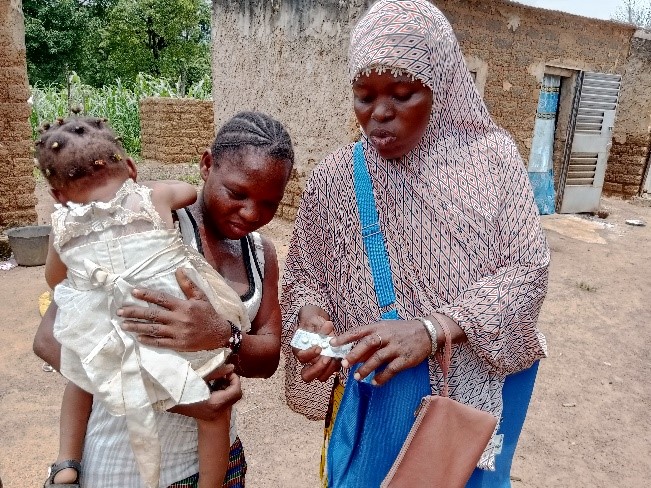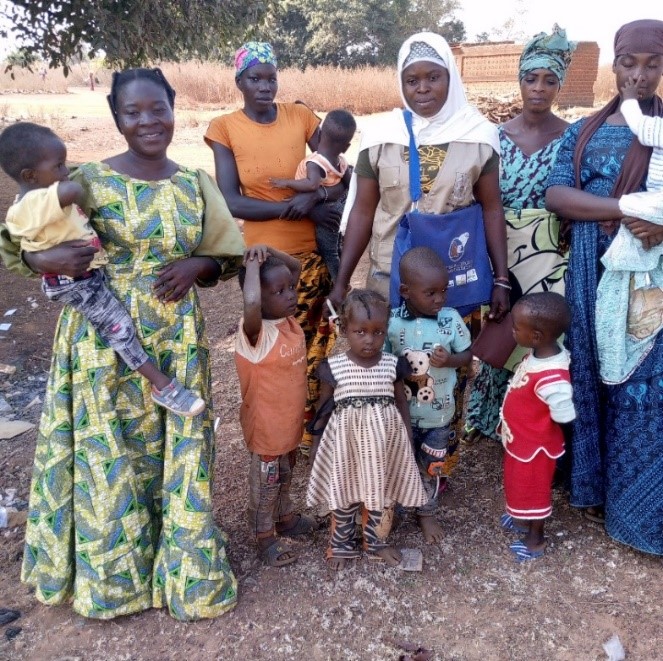It rains a lot in Diébougou in the Sud-Ouest region of Burkina Faso. This means that malaria transmission occurs throughout the year in this West African country, but it’s especially high during the peak season, which runs from June to October, increasing the importance of community-based health care.
From the health facility in Diébougou, the capital of Bougouriba Province, health workers must travel 12 kilometers to reach communities.
“We walk an additional seven kilometers through a hamlet of crops [farming village] to reach the families in Limalia village,” says Hélène Sebgo, a community health worker. “When it rains, it’s impossible to get there by motorbike because of the poor state of the track. It takes an added three hours to travel through streams and mud.”

Adama Sawadogo, who has been a community health worker for four years, accompanies Hélène, who has worked for the Ministry of Health and Public Hygiene for the past two years.
“During the visits, we focus on malaria prevention for children under five years,” says Adama.
They promote seasonal malaria chemoprevention (SMC), one of the major interventions implemented during periods of high malaria transmission. The campaign aims to prevent malaria in children between 3 and 59 months by administration of regular doses of antimalarial medication during the rainy season.
“We focus on communicating the importance of giving children this medicine at the same time every day, for three days. The mothers understand the message and follow the instructions,” says Hélène.
To be effective, Hélène and Adama rely on interpersonal strategies to mobilize men through the religious leader—the village imam—to encourage mothers to administer the medicine correctly and on time to their children. “The imam is a respected person in the village. Before the campaign begins, we talk to him to pass on the information to the husbands and men, who in turn talk to their wives and families. This makes our work a lot easier in the village,” says Adama.

The U.S. President’s Malaria Initiative through the Integrated Health Services project, which Jhpiego leads, is supporting the Government of Burkina Faso in implementing the SMC campaign to prevent malaria in more than 843,000 children from 19 districts in three regions: Centre-Est, Centre-Ouest, and Sud-Ouest.
But the SMC campaign is not the only tactic used to prevent malaria. Community distributors encourage families to sleep under insecticide-treated nets every day and night and pregnant women to follow the advice of health workers regarding intermittent preventive treatment for malaria. Two local partners, Association Songui Manégré/Aide au Développement Endogène and Conseil Burkinabè des Organisations de Développement Communautaire, also conduct social behavior change activities through community dialogue sessions to complement these campaigns.
“According to the data in our consultation registers, from June to October 2023, we received 11 children from Limalia. But none of these children were admitted because of malaria. This was also the case in 2022. Hélène and Adama’s commitment is great as they focus on finding every child in the village—including hard-to-reach areas—and ensuring that the three doses are administered correctly, completely, and on time,” says Djingri Sogli, nurse in charge at Diébougou health facility.
The difficulties in reaching villages, such as Limalia, do not dampen Hélène’s and Adama’s spirits and commitment because the mothers recognize their work. They recall one mother’s feedback, “If you have agreed to brave the challenges of coming to our village to give medicine to children, this must be very important. Thank you very much for what you do.”
This article was reviewed by Dr. Gladys Tetteh, Jhpiego’s Senior Technical Director for Malaria.
Souleymane Zaré is a communications specialist in Jhpiego’s Burkina Faso office.



